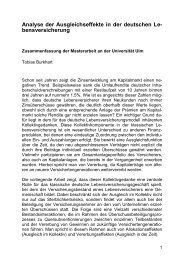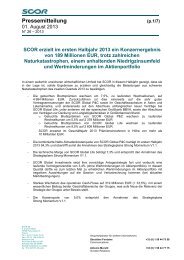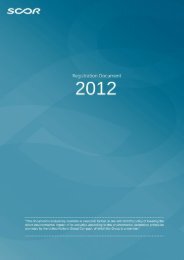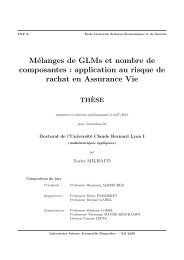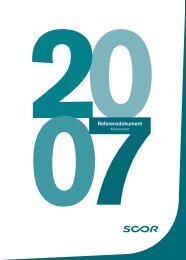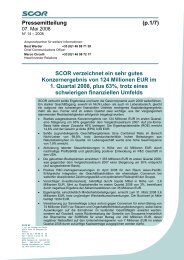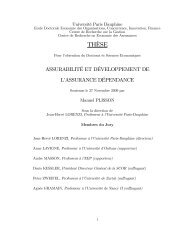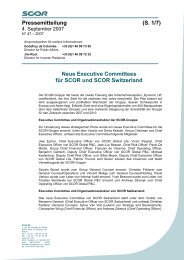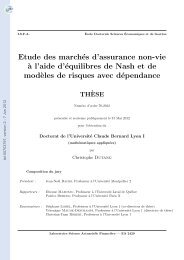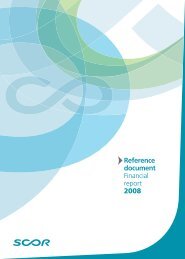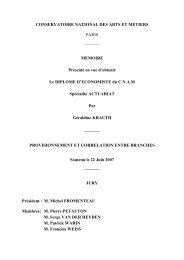Bancassurance and its status around the world - Scor
Bancassurance and its status around the world - Scor
Bancassurance and its status around the world - Scor
Create successful ePaper yourself
Turn your PDF publications into a flip-book with our unique Google optimized e-Paper software.
Strong potential to be exploited<br />
In Singapore, <strong>the</strong> role of bancassurance is growing<br />
continually <strong>and</strong> is changing traditional distribution<br />
patterns. The number of traditional agents has been<br />
falling for several years: 12,000 in 2004 compared<br />
with 20,000 in 1998. The reasons? Stricter conditions<br />
for obtaining a licence, reduced commission rates<br />
<strong>and</strong> above all <strong>the</strong> growing role of bancassurance.<br />
According to <strong>the</strong> Life Insurance Association of<br />
Singapore, in 2004 bancassurance accounted for<br />
30% of new policies.<br />
For a long time, <strong>the</strong> insurance market in South Korea,<br />
<strong>the</strong> <strong>world</strong>’s 7th biggest, remained traditional. Until<br />
recently resistant to any reform, <strong>the</strong> Korean insurance<br />
industry <strong>the</strong>n developed rapidly with <strong>the</strong> country’s<br />
entry into <strong>the</strong> OECD in 1996. Financial deregulation<br />
<strong>the</strong>n began, allowing new players – <strong>and</strong> especially<br />
foreign companies – to come in. The financial crisis<br />
of 1997 <strong>the</strong>n forced <strong>the</strong> country to restructure <strong>its</strong><br />
financial organization <strong>and</strong> to eliminate certain<br />
barriers between banks <strong>and</strong> insurance companies.<br />
Thus, having been long considered a threat to <strong>the</strong><br />
traditional insurance market, bancassurance was<br />
officially authorized in South Korea on August 30,<br />
2003, to come into effect on April 1, 2004.<br />
Never<strong>the</strong>less, due to pressure from <strong>the</strong> traditional<br />
insurers, <strong>the</strong> pace of this deregulation – initially<br />
scheduled to be a three-stage process chiefly<br />
affecting <strong>the</strong> range of policies authorized within <strong>the</strong><br />
banking network – was slowed down by government<br />
decision in January 2005:<br />
● Initially, only pure savings products <strong>and</strong> loan<br />
protection insurance were authorized;<br />
● In <strong>the</strong> second stage scheduled for April 2005<br />
banks will be authorized to sell Accident products<br />
<strong>and</strong> Health products containing a so-called<br />
"maturity repayment" clause (up to 80% of<br />
premiums reimbursed if no claims after 8 years);<br />
● In <strong>the</strong> third phase in October 2006, government<br />
authorization will be extended to all Accident<br />
<strong>and</strong> Health policies;<br />
● At <strong>the</strong> end of <strong>the</strong> process <strong>and</strong> total deregulation<br />
in April 2008 (instead of 2007), <strong>the</strong> banks will<br />
be permitted to sell all life insurance products,<br />
including Group policies.<br />
However, so far, <strong>the</strong> supervisory authorities (Financial<br />
Supervisory Service – FSS) <strong>and</strong> <strong>the</strong> Ministry of<br />
Finance <strong>and</strong> Economy are continuing to impose<br />
32 focus october 2005 <strong>Bancassurance</strong><br />
numerous limitations <strong>and</strong> restrictions, which are<br />
putting a brake on growth:<br />
● Policies from a single insurance company cannot<br />
represent more than 49% of a bank’s total<br />
insurance sales. According to a plan referred to<br />
by <strong>the</strong>se authorities in January 2005, this<br />
proportion will soon be restricted to 25% (33%<br />
if two insurance companies have <strong>the</strong> same<br />
majority stake in <strong>the</strong> bank’s capital); this will put<br />
paid to any exclusivity agreements;<br />
● Insurance products can only be sold in a<br />
specifically assigned area within <strong>the</strong> bank<br />
branch; telephone selling, door-to-door selling,<br />
etc, are prohibited;<br />
● The personnel approved to sell insurance<br />
products must be qualified for this job <strong>and</strong> hold<br />
a special diploma. There must be at least one<br />
(maximum two) insurance product sellers in each<br />
bank branch;<br />
● Since 1987, local insurance companies have<br />
only been able to create subsidiaries within <strong>the</strong><br />
same sector as <strong>the</strong> parent company; a life<br />
insurance company will only be able to create<br />
a life insurance company. None<strong>the</strong>less, <strong>the</strong> FSS<br />
is hoping to lift this restriction <strong>and</strong> move towards<br />
a more flexible position.<br />
Within <strong>the</strong> framework of <strong>the</strong>se strict regulations, <strong>the</strong><br />
market is being structured <strong>and</strong> distribution<br />
agreements, joint ventures <strong>and</strong> o<strong>the</strong>r groupings are<br />
being formed all over <strong>the</strong> place.<br />
For example:<br />
● Kookmin Bank, South Korea’s leading bank in<br />
terms of receipts, has created <strong>its</strong> bancassurance<br />
subsidiary KB LIFE as a joint venture with ING.<br />
In addition to this joint venture, Kookmin Bank<br />
also has a distribution partnerships with four<br />
o<strong>the</strong>r insurance companies: Samsung Life<br />
Insurance Co., Kyobo Life Insurance Co., Tong<br />
Yang Life insurance Co. <strong>and</strong> Korea Life Insurance<br />
Co;<br />
● Woori Bank, <strong>the</strong> country’s second largest<br />
banking network, is currently negotiating a joint<br />
venture with <strong>the</strong> powerful Samsung Life;<br />
● Shinhan Financial Group <strong>and</strong> Cardif Life<br />
Insurance have created SH&C Life Insurance<br />
Company, a bancassurance joint venture.<br />
Three months after <strong>the</strong> opening up of <strong>the</strong> market,<br />
new contract insurance premiums have grown three<br />
times as fast as those generated in <strong>the</strong> o<strong>the</strong>r



